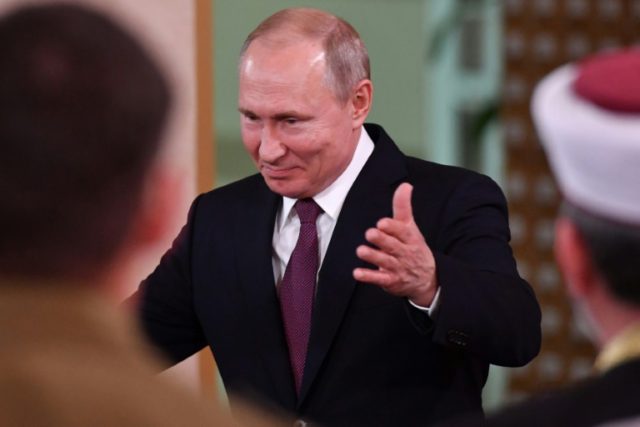Russian President Vladimir Putin spoke on Monday at the annual Russian Internet Governance Forum, portraying himself as a champion of Internet freedom and called on the world to unite in a crackdown on “cybercrime” and “illegal content.”
“I am confident that we should continue to follow the principle of the freedom of the Internet, creating conditions for a wide exchange of information and the implementation of business initiatives and startups,” Putin declared, as reported by Russia’s Tass news service.
“At the same time, it is also important to counter the risks and challenges of cyber crime and the spread of illegal content, which poses a threat to people’s rights and the state’s interests,” he continued.
Putin celebrated Russia’s advances in Internet technology, which provide “a significant competitive advantage to Russia to become one of the leaders of the digital age that has already begun.”
A few weeks before delivering his ode to Internet freedom, Putin signed a set of new laws that criminalized “disrespect for the society, government, official government symbols, constitution or governmental bodies of Russia” and publishing anything the government decides is “fake news.”
One of the “official government symbols” that must be respected online at all times is President Vladimir Putin. The first enforcement exercise under the new censorship law occurred on April 2, when Russian news websites were forced to remove stories about spray-painted graffiti that referred to Putin as homosexual. The news sites protested the order to suppress their stories as “an act of censorship that is completely unfounded.”
In his remarks Monday, Putin articulated the idea that only by giving the state vast powers to quash “fake news” can people be guaranteed the true freedom of accurate information; only by giving the state power to block predatory subversive voices can the great open plains of the Internet be made safe for herds of good citizens to roam free. Russia’s censorship laws, especially with the new enhancements imposed by Putin in March, are a grotesque parody of the conversation most Western nations are having about limiting freedom in order to purify it.
A coalition of ineffectually protesting journalists and human rights activists signed a petition arguing that the vaguely-worded censorship law gave Putin virtually unlimited power to suppress any speech he deems harmful to the Russian state or social harmony. The Russian government already had the power to rifle through social media databases, demand keys to encrypted communications, and control search engine results to suppress information it deemed harmful.
The Kremlin dismissed complaints by arguing the entire world is moving toward heavier censorship and Russia merely followed the trend.
“This sphere of fake news, insulting and so on, is regulated fairly harshly in many countries of the world including Europe. It is therefore, of course, necessary to do it in our country too,” Kremlin spokesman Dmitry Peskov said in March.
The Economist noted in March that Internet freedom is degrading around the world under the influence of authoritarian regimes such as Russia and China because Big Tech companies in the West are too willing to accommodate their demands.
One of the chief demands from authoritarians is tighter control over massive global platforms such as Google and YouTube because they find it too easy for their citizens to escape from state-run media to online alternatives. Threats to exclude international social media companies from massive emerging markets, because authoritarian governments warn they will have no choice but to block unruly platforms with their national firewalls, are enough to make many corporate titans wonder if free speech is overrated, and over-valued.
The National Interest cautioned in March that Russia’s new Internet laws move it a step closer toward erecting a Great Firewall on par with China’s by creating a Russian Domain Name System (DNS) that would effectively throttle all Internet traffic in and out of Russia with a set of state-controlled servers. Google is among the companies reportedly working with Russian censors to preserve its access to the Russian market.
Putin’s remarks about “Internet freedom” at the Russian Internet Governance Forum were really a warning to international corporations that compliance with the Russian and Chinese concept of “Internet sovereignty” – i.e. giving authoritarian regimes the control they demand to prevent dissenters from using websites and social media to coordinate action against the interests of the state – will be the cost of doing business in these repressive countries. Accessing the business opportunities Putin touted will require accepting his definition of Internet freedom.

COMMENTS
Please let us know if you're having issues with commenting.